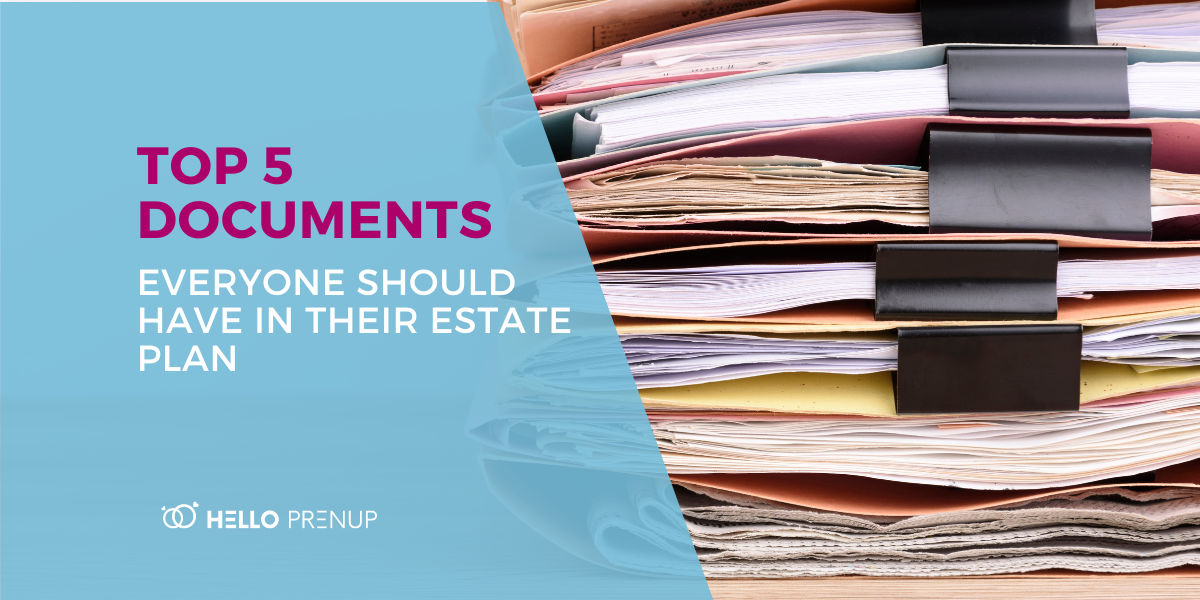[This article was written by Patrick Hicks, Head of Legal at Trust & Will, the premier online estate planning and settlement platform]
In my Estate Planning 101 editorial, I discussed the meaning behind estate planning. I also emphasized why it’s so important to have one in place.
Here’s a quick review:
Estate planning is the process of putting your affairs in order for when you pass away or if you become medically incapacitated. It contains a set of legal documents, with each document representing different types of tools that can be used to your advantage. Which documents and which legal instruments you use are up to you; estate plans are highly customized to each individual’s unique circumstances and objectives.
There are several reasons why estate planning is so important. First and foremost, estate planning documents are legally binding and supersede your state’s defaults. This means you get to have a say over what happens to your property, rather than leaving things up to chance or what the law dictates. Second, your estate plan has more to do than just property and assets. It allows you to make final arrangements, nominate a guardian for your children or pets, and even specify your wishes regarding medical decisions in the case you become incapacitated. Estate planning has something to offer to everyone at any age, marital status, or income level.
The Top 5 Estate Planning Documents, Explained
Now that these two important things have been addressed, you may be wondering how you should make up your estate plan. Earlier, I mentioned how estate plans are composed of a set of legal documents, with each document serving different purposes and achieving different objectives. Which ones you use are entirely up to you. However, this advice might not be particularly helpful when you’re just getting started.
To help, here’s a list of the top 5 documents that everyone should consider having in their estate plan. Consider these your foundational documents to start out with. Once you have these in place, you can begin to tackle more complex or niche legal instruments if you so choose.
- Last Will & Testament (including Guardianship)
- Living Will
- Medical Proxy
- Durable Power of Attorney (POA)
- Living Trust
Last Will & Testament
If for nothing else, you should have a Last Will & Testament in place. The will is the most foundational estate planning document that everyone should start with.
This document specifies how you would like for your property to be distributed when you pass away. You will list descriptions of your property, assets, and personal belongings, along with your designations of how they should be divided amongst your beneficiaries. Your beneficiaries are commonly loved ones, such as your spouse and children, but could also be a parent, a friend, or even a non-profit that you’d like to support.
Putting a will in place is important because you get to make sure that your property is distributed in the way you would have wanted. In the absence of a will, the court system is forced to use probate and intestacy codes by default to determine how property should be passed on. The results may not be in line with your wishes.
Your will is also extremely important if you have dependent children and/or pets. This is where you’ll name a guardian who will look after your loved ones should you pass away.
Living Will
Contrary to your will, a living will has nothing to do with property distribution. Instead, it addresses your wishes regarding your future medical care.
Your living will goes into effect should you become medically incapacitated, such as due to a terminal illness or coma. If you are unable to make decisions or communicate them on your own, then the living will is used to determine the correct course of action.
In the document you can specify certain medical treatments you want or would refuse, whether or not you accept life-sustaining interventions, or any other important wishes or beliefs to note.
Living wills are extremely helpful because they can alleviate the pressure from loved ones who would otherwise be forced to make difficult decisions on your behalf. Sometimes, these decisions can be matters of life-or-death. Together, your loved ones and medical care providers will feel confident knowing they are providing the medical care you’d want.
Medical Proxy
A medical proxy, also known as a healthcare proxy or medical power of attorney, is a document in which you name an individual you trust to make medical decisions on your behalf. They are authorized to consult and make decisions with your doctors in the case that you are incapacitated and require medical treatment. They are also typically authorized to access, view, and discuss your medical records when necessary.
Together, your medical proxy and living will make up an estate planning tool called an advance directive.
Durable Power of Attorney
A durable power of attorney is a document used to name an agent who is authorized to act on your behalf. The document is called “durable” because it is in effect during your lifetime but does not expire in the case of your death or incapacitation. In other words, it’s still in effect when you might be needing it the most.
A power of attorney can be authorized to do set things, such as manage your personal affairs, pay your bills, take out insurance policies in your name, file your taxes, or even run your business. Having such a trusted person in your corner can be helpful to prevent interruptions in your personal or business operations and ensure continuity in times of need.
Living Trust
Last but not least is your living trust. Trusts are optional, but offer certain protections that your will can’t. A trust is a fiduciary arrangement that allows another entity (your Trustee) to own and manage your assets on your behalf.
You can transfer your personal assets and property into the trust during your lifetime (thus “ living trust”) such that they are not a part of your estate. This can offer your estate certain legal and tax protections. Even better, these assets don’t have to go through probate, which can be a lengthy and expensive process which adversely can impact your loved ones.
Trusts give you greater control over your estate. For instance, you can give your Trustee very specific instructions over how assets in the trust should be managed, as well as the manner in which they should be distributed to beneficiaries of the trust.
Let’s say you have a minor child. If you were to pass away with a will in place, but no trust, then your estate could potentially pass to them immediately following the closing of probate. As a parent, this worries you. Not only do you want your assets to be held in an account that allows them to earn interest and grow, you don’t want your child accessing these funds until they reach an appropriate age. By implementing a trust, you have the option of setting certain parameters, such that the child should only receive X percent of the estate once they reach a certain age or milestone, and then X percent monthly or annually thereafter. Of course, the Trustee can distribute enough necessary to meet their needs while they grow.
In another example, let’s say you have an adult child who has a disability. They qualify for Supplemental Security Income (SSI). However, if you pass away and the entirety of your estate passes to them, then it automatically disqualifies them from receiving SSI benefits. To address this issue, you could instead transfer your estate assets into a fiduciary trust for which your child is the beneficiary. Your trustee is then instructed to distribute just enough funds each month to give your child a comfortable life without putting them over the SSI income limit.
There are many unique scenarios in which a trust can be leveraged in a similar manner to protect your interests and your loved ones.
Build Your Estate Plan The Way You Want It
The 5 estate planning documents introduced in this guide are highly suggested, but not all are required. An estate plan is highly customizable per your unique circumstances, your family dynamic, and your vision for your legacy. The purpose of estate planning is to leverage legal instruments to help you achieve your desired outcome. Luckily, there are a wide variety of instruments available at your disposal to do just that. Sometimes the hardest part is picking which ones. If you are interested in creating an estate plan, head over to Trust & Will to find out how we can support you.

Patrick, J.D., LL.M. is Head of Legal, serving as our General Counsel overseeing all attorney-related operations, including regulatory efforts and legal affairs. As a seasoned estate planning attorney, Patrick brings over a decade of knowledge and real-life taxation law experience to our service offerings. He holds a B.A. in Economics from Davidson College, a J.D. from Washington University in St. Louis School of Law, and an LL.M in Taxation from the University of San Diego. Before joining Trust & Will, Patrick practiced law in the trusts and estates practice group of law firm Hahn Loeser & Parks LLP. While attending undergrad, Patrick served as a firefighter for the Davidson Fire Department.

0 Comments